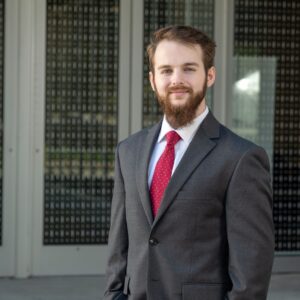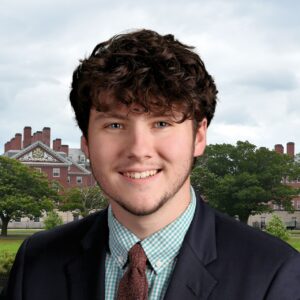Bold Ideas, Emerging Leaders: Roosevelt Network Emerging Fellows Journal 2023
December 1, 2023
In this collection of undergraduate research papers, student authors from the Roosevelt Network Emerging Fellowship program engage deeply with the failures of neoliberal thought and detail how we can shift paradigms in service of our worldview and the advancement of progressive policy.
Diving deep into policy research, the Emerging Fellows ground themselves in Roosevelt’s vision for a just economy and multiracial democracy.
Student Papers
Worker Power and Economic Security

Cooperative Colorado: Locking in Prosperity
By Tom ByronAs new laws like the Inflation Reduction Act revive interest in public investment, labor advocacy, and green manufacturing (Sullivan 2023), Colorado is poised to enjoy another decade of rapid growth. But growth alone is not enough to secure shared prosperity for Coloradans—not when corporate greed captured so much of the state’s economic growth over the past 10 years (Abidh and Danninger 2017). The suite of progressive policies enacted by the Biden administration offers an opportunity to rebalance economic power in states like Colorado, where for far too long, workers have not reaped the benefits of the growth they helped to create. As the American economy enters an era of rapid transformation, worker ownership offers a model of governance that empowers workers. As the US continues to find its way beyond neoliberalism, Colorado can take the lead in building a cooperative economy that puts workers first.
About the Author
Tom Byron (he/him) is a recent graduate of Colorado College, where he earned a BA in political science. Born and raised in Arlington, Virginia, Tom’s Colorado family and proximity to Washington, DC, fostered his interest in economic justice, public service, and the politics of the Mountain West. During high school and as an undergraduate, Tom worked in field and campus campaign organizing in both Virginia and Colorado, ranging from Colorado Springs school board races to the Virginia House of Delegates to the Colorado Democratic Party Coordinated Campaign. He began his work in policy writing through the Roosevelt Network, which encouraged his interest in the role of corporate and labor power in American life. After graduating, Tom was selected as a 2023–24 Coro Fellow in Public Affairs, and is working in St. Louis, Missouri, with his cohort.

State Preemption: Antidemocratic and Anti-Worker Tools of Austerity
By Macy StacherThe United States faces persistent crises of economic instability, poverty, climbing costs, and inequality that state and federal governments have yet to adequately address (Piketty 2020). With this leadership vacuum, city and municipal governments have stepped up to legislate solutions for working families, but many state legislatures are intervening to limit local control (Phillips 2017). Pennsylvania’s 2006 minimum wage law raised the state minimum wage to $7.15 per hour while preempting and prohibiting local wage hike ordinances in cities and municipalities from Philadelphia to Erie (43 Pa. Stat. Ann. § 333.114a). Initially derived from the Supremacy Clause of the United States Constitution, preemption is a legal doctrine that empowers state governments to limit the legislative jurisdiction of lower levels of government (Cornel LII). Preemption rules also act as policy tools that are interpreted by courts and implemented in a wide array of policy matters (NLC 2018). The most common preemption policy tool is a ceiling preemption: a prohibition on enacting local laws that exceed higher-level government standards (ChangeLab Solutions 2019).
About the Author
Macy Stacher is a student at the University of Pennsylvania graduating with a BA in political science and a master of science in social policy in 2024. Macy is committed to building a multiracial working-class movement dedicated to raising marginalized communities’ standards of living and guaranteeing that all Americans can live a life of dignity and respect.
At Penn, Macy is the president of the QuestBridge Scholars Network, a scholarship community that supports low-income students like himself. He developed a passion for labor policy and economic justice as an active political organizer on campus, where he has spearheaded resident assistants’ unionization efforts, and mobilized voters to elect progressives across Philadelphia. Upon graduating, Macy intends to delve into economic research and engage in legal advocacy to amplify worker power.

Worker Voice Ensuring Equity, Dignity, and Quality Care: How Unions Mitigate Harm in Electronic Visit Verification (EVV) and Medicaid Reform
By Hunter AkridgeThe COVID-19 pandemic showed us the importance of our frontline care workforce. This includes doctors and nurses as well as other home care workers who are often overlooked and unseen. These workers are critical to our national care infrastructure and will be even more so going forward. The United States faces a demographic transition where there will be more demand for long-term home care support services. By 2040, there will be nearly 81 million adults 65 and older, a 44 percent increase from 2020 (Vespa, Medina, and Armstrong 2020). Seventy percent of those in that age bracket will need long-term care services (Johnson 2019). Therefore, home care will be one of the fastest-growing occupations, with more than a 25.4 percent increase in employment over the next decade (US Bureau of Labor Statistics 2022).
About the Author
Hunter Akridge is a research associate in the Tech Solidarity Lab at Carnegie Mellon University, where he researches the impact of technologies on essential workers. Having recently graduated from Emory University with degrees in anthropology and economics, he brings a critically informed and social science perspective to research on emerging technologies in workforce contexts. Hunter has worked on movement-aligned research projects on and with ride-hail, home care, transit, and childcare workers. For example, in his current role, one of Hunter’s projects involves collaborating with the AFL-CIO Technology Institute and ATU/TWU to uncover the experiences of bus operators in the context of ongoing transit automation. He plans to enroll at Princeton’s PhD program in anthropology in the fall of 2024 to continue doing movement-aligned research and critical scholarship.
Race and Democracy

Addressing Systemic Barriers for Working-Class Candidates Running for US Federal and Wisconsin Elected Offices
By Angela MaloneyIn the United States, the working class—those employed in manual labor, the service industry, or clerical jobs—represent over half of the labor force, but make up only 10 percent of elected city council representatives, 3 percent of elected members of state legislatures, and a mere 2 percent of Congress (Carnes 2018a). More than 50 percent of legislators in the 116th Congress were millionaires (Evers-Hillstrom 2022), a group that makes up just 8.8 percent of the US population (McCain 2023). Research shows that overwhelmingly, working-class people are disproportionately underrepresented at all levels of government. This is because most working-class people lack the personal finances, time, and political capital to enter races. Flexibility in time, finances, and political capital give wealthy candidates access to party leaders who recruit candidates and support campaigns, and these candidates have the excess savings to afford income lost due to campaigning. Furthermore, working-class candidates’ ability to succeed in elections at both the federal and state levels is often viewed with skepticism stemming from bias by party leaders.
About the Author
Angela Maloney (she/her), a native of Madison, Wisconsin, is a recent May 2023 graduate of the University of Wisconsin-Madison, where she doubled majored in community and nonprofit leadership and international studies: politics and policy in the global economy, with minors in public policy, Chicano/Latino studies, development economics, and leadership. She has been involved in grassroots organizing, working on campus to expand students’ access to the ballot and working off campus as a labor organizer. As president and strategic planning officer of the Zoe Bayliss Student Housing Cooperative, the last student housing cooperative in the state of Wisconsin, Angela works to ensure that students have affordable housing options. She has also served as a caseworker in the Office of Wisconsin Governor Tony Evers and as a legislative intern with the Washington, DC, office of Rep. Mark Pocan (D-WI). Angela is currently pursuing a master of public affairs and a career focused on expanding working-class representation in elected office at all levels of government. In her free time, she likes spending time in nature, running, and appreciating classic vines.

Doing More with More: Advancing Racial Equity in Maryland Higher Education
By Crystal ForetiaAt the end of June 2023, the United States Supreme Court issued two decisions that undermine the survival of historically Black colleges and universities (HBCUs) and their student bodies. First, the Supreme Court effectively overturned race-conscious college admissions policies in Students for Fair Admissions v. Harvard University and Students for Fair Admissions v. University of North Carolina (Liptak 2023a). Then, the Supreme Court struck down President Joe Biden’s first student debt cancellation program in Biden v. Nebraska, which would have eliminated $400 billion in student debt (Liptak 2023b). The ruling in both Students for Fair Admissions cases will likely increase the demand on HBCUs to fill educational opportunity gaps for prospective Black students (Perry et al. 2023; C. Adams 2022). HBCUs are generally oversubscribed relative to their financial capacities, so they will likely be unable to handle an influx of students without additional state funding.7 The ruling in Biden v. Nebraska will disproportionately impact HBCU graduates, who carry a greater debt burden than those who attend predominantly white institutions (PWIs) (Koch and Swinton 2023).
7Swinton, Omari H. (Economics Department Chair at Howard University), video interview with author, July 5, 2023.
About the Author
Crystal Foretia (she/her) is a recent graduate of Columbia University, where she earned a BA in political science and history. Born and raised in Silver Spring, MD, Crystal is the youngest daughter of Cameroonian immigrants. Her identity as a first-generation African-American and her upbringing near Washington, DC, fostered her interests in civil rights, comparative politics, and the history of the African diaspora. As an undergraduate, Crystal conducted policy research, often at the intersection of race and democracy, for the House Judiciary Committee, Center for American Progress, and the Roosevelt Network. Following graduation, Crystal began working as a policy and legislative administrator for the Maryland Department of Juvenile Services, and has been named a 2023 Govern for America Fellow. In her spare time, Crystal writes poetry and visits art exhibitions.

New Opportunities for Zoning Reform in Rural Areas
By Jack WhiteSeemingly benign, local zoning codes are the focal point in a lively debate concerning persistent structural barriers to working-class needs, such as economic opportunity and affordable housing. This is because the American regional planning model creates ample opportunities for wealthy residents to dominate local zoning meetings and thwart housing production efforts that seek to serve the common interest. This is especially true in urban settings, where the arcane dynamics of zoning hearings can make it easier to organize a small group of people who espouse NIMBY (“Not In My Back Yard”) ideology than to pursue common good projects. This paper draws attention to the need for zoning reform in rural America, an oft-overlooked dimension of the zoning reform debate, which tends to focus on urban settings. In the wake of COVID-19, small-town communities began facing rampant property speculation from outside forces looking to commodify the newly rediscovered benefits of rural living; the result has been a sharp decline in affordable housing opportunities for working-class rural families.
About the Author
Jack White is a recent graduate of Harvard University, where he studied government with a focus on domestic policy via the undergraduate public policy track. At Harvard, Jack was president of Harvard Undergraduates for Bipartisan Solutions where he oversaw real-world policy projects and hosted world-class speakers. Jack also served as a steering committee member for the Mindich Center for Engaged Scholarship, an organization creating opportunities for students to apply their learning outside the classroom with real-world impact projects. As a Roosevelt Institute emerging fellow, Jack has researched the effects of local regulations on housing accessibility in rural areas. A committed advocate for rural and Indigenous communities like his own, Jack hopes to continue working to address place-based disparities through public service.
Corporate Power

Addressing the Corporate Consolidation of Medical Providers in the Kansas City Metropolitan Area
By Pratik ThakurRecently, Kansas City has experienced rapid health-care consolidation. There has been a wave of mergers and acquisitions among local medical providers, especially due to the financial losses many of them faced during the pandemic. As these health systems expand by acquiring or integrating with their competitors, they gain the ability to dictate prices for administering care in the area because of minimal competition. Consequently, their rising dominance in the market can lead to higher costs for patients with no evident improvement in the quality of care provided.
About the Author
A Kansas native, Pratik Thakur earned his BA with honors from the University of Southern California, where he studied biology, health policy, and economics. He was also elected to Phi Beta Kappa and the Order of the Laurel and the Palm, the university’s highest distinction. As a Leonard D. Schaeffer Fellow in Government Service, Pratik interned at the Centers for Medicare and Medicaid Services. Through the USC Provost’s Fellowship, he conducted health policy research at the USC Sol Price School of Public Policy, with his work featured by the Schaeffer Center for Health Policy and Economics. On campus, Pratik was chapter president of Share a Meal, a nonprofit that provides burritos and water to unhoused communities in Los Angeles. Overall, Pratik is passionate about advancing health outcomes and care delivery by intersecting medicine and policymaking.

Corporate Influence on Private Prisons and Mass Incarceration in Alabama
By Eriko DarcyThis policy brief explores the impacts of private prisons and corporate power on mass incarceration in the United States and examines the unique case of Alabama, where one plan to build private prisons was halted in 2021. After a 2020 Department of Justice (DOJ) investigation exposed systemic violence in the state’s prison system, the crux of the state government’s solution was to construct two private prisons. Lawmakers and individuals who stood to profit from the building of private prisons ultimately failed to take control of the state’s jail system due to organized grassroots opposition. However, Alabama’s prison system is still notorious for violent facilities, with over 270 deaths in custody and 19 homicides in 2022 alone (Equal Justice Initiative 2023).
About the Author
Eriko Darcy is a student-athlete pursuing a double major in economics and political science at Wellesley College. During the 2022–23 school year, Eriko studied politics and economics at the University of Oxford, St. Peter’s College. Hailing from Chicago, Eriko is not only committed to her academic pursuits but also excels as a sprinter on her college’s track and field team. Driven by a deep-seated commitment to criminal justice reform, Eriko’s journey in advocacy began with her involvement as a volunteer at the Woods Foundation. Through her dedicated efforts, she played an integral role in investigating cases of wrongful convictions and advocating for fair sentencing practices. This experience ignited a passion for addressing systemic issues within the criminal justice system. Beyond her academic and athletic achievements, Eriko is also a talented pianist. She has organized and performed in fundraising concerts with her sister, Kimiko, that highlight pressing social justice concerns. Eriko’s multifaceted involvement underscores her dedication to creating positive change at the intersection of law, policy, and music.

Corporate Welfare in the Sports Industry: Stadium Subsidies and Tax Exemptions in New York State
By Jason GuallpaIn New York’s sports entertainment industry, corporate welfare regarding stadium infrastructure has become the byproduct of corporate power’s consolidation and exertion. In 2022, Terry Pegula, owner of the Buffalo Bills, benefited from a record $850 million direct government infrastructure subsidy tied to New Highmark Stadium from New York State (NYS) (Ferré-Sadurní 2022). In New York City, Madison Square Entertainment continues to benefit from a property tax exemption clause on its Madison Square Garden (MSG) property. These corporate giveaways follow a cycle. Massive wealth affords corporate sport entities the luxury to hire prestigious lobbying firms, shape public messaging, and play an influential role in local campaigns in order to consolidate their corporate power. When sports executives contemplate relocating their team, they assert that government subsidies and tax breaks are essential for the sustained operation of their business. Without these incentives, corporate owners threaten NYS with the potential relocation of their teams—and the consequential loss of economic activity and benefits (Breech 2021).
About the Author
Jason Guallpa is a senior enrolled at the Zicklin School of Business at Baruch College currently pursuing a major in computer information systems accompanied by a minor in economics. At Baruch, Jason is a treasury member at the Ecuadorian Club, an organization dedicated to sharing Ecuadorian culture across collegiate institutions. Outside of academia, Jason is a rugby player for the Gotham Knight Rugby Club, a club dedicated to creating an inclusive environment for the LGBTQ community and other underrepresented groups. Jason also currently holds the position of a data fellow at Bluebonnet Data. In this role, he provides technical support for nonprofit organizations dedicated to enhancing working-class communities. As an advocate for community and progressive change, Jason aspires to make a meaningful impact by contributing to policy changes at either the nonprofit or government level.
Climate Change and Economic Transformation

Beyond the Freeze: A Progressive Vision to Improve the Texas Power Grid and Invest in the New Economy
By Rogelio MeixueiroWhen natural disaster strikes, political posturing and infighting often make it difficult to fully understand the extent of what happened and who is responsible for the response or lack thereof. This is especially true for complex infrastructure and regulatory failures like the Texas freeze of 2021. In February 2021, Winter Storm Uri exposed the severe outcomes of neoliberal policies that for decades have favored market-driven privatization of the Texas power grid over its resilience and reliability for consumers and communities across the state. Covering approximately 90 percent of the state’s electrical load, many were surprised when the grid failed to meet the needs of millions of freezing Texans during a snowstorm that paralyzed the state (Krauss et al. 2021). The Texas power grid’s inadequate infrastructure left more than 4.5 million households (roughly 10 million Texans) without electricity at its peak, some for several days (Busby et al. 2021), and it exposed the vulnerabilities and shortcomings in the state’s energy systems. Texans dealt with widespread food and water shortages, burst pipes, and the dire consequences of seeking warmth—including house fires, carbon monoxide poisoning, and hypothermia (Jeanty 2022). The state Department of Health and Human Services released a final report placing the number of dead at 246 (Svitek 2022). AccuWeather estimated economic losses from lost output and damage to be $130 billion in Texas alone, and $155 billion for the country as a whole (Busby et al. 2021).
About the Author
Rogelio “Rojo” Meixueiro is a student of environmental science and public policy at the University of Texas in Arlington, focusing his academic endeavors on the convergence of environmental stewardship and social justice. As a first-generation Indigenous American student, he takes great pride in his ancestral ties to Oaxaca, Mexico.
Rogelio has successfully integrated his scholarly interests with practical community organizing in recent years. Amidst the COVID-19 pandemic, he played a role in organizing endeavors centered around public health and the rights of essential workers across the Dallas-Fort Worth metroplex. It was during the Texas winter freeze in 2021 that Rogelio organized mutual aid efforts and coordinated initiatives in the metroplex that offered crucial assistance to address language access and environmental justice for individuals in Black and Latino neighborhoods impacted by the severe weather conditions. He now advocates for progressive policy that strengthens the rights of working families across Texas at the state and federal level. His viewpoint as a community organizer and his personal affiliation with social movements fuels his dedication to establishing a more equitable and just future for all people.
About the Roosevelt Network
The Roosevelt Network develops and supports undergraduate college students and early career professionals—in particular, those who hold identities historically denied political power—to be the next generation of leaders in the progressive policy ecosystem. We are creating a pipeline of new leaders who champion ideas that rebalance power in our economy and democracy. As a program of the Roosevelt Institute stewarding the legacy of Eleanor and Franklin Roosevelt into the 21st century, we believe that we can rewrite the rules by changing who writes them.